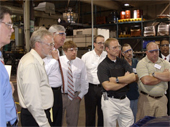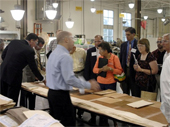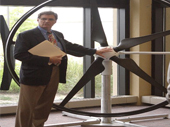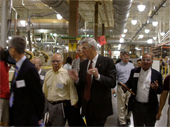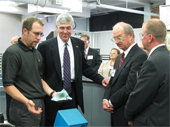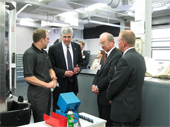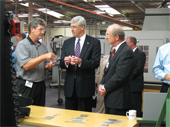|
|
|
|||||||||||||||||||||||||
|
The U.S. Department of Commerce’s Sustainable Manufacturing Initiative and Public-Private Dialogue The following projects implement the “next steps” identified by various stakeholders at the September 2007 event and enumerated in the April 2008 Federal Register notice. Sustainable Manufacturing’s American Regional Tours - SMART Grand Rapids, MI (September 3, 2008)
Rochester, NY (September 23, 2008)
SMART city events will most likely include tours of local manufacturing facilities that showcase firms that are incorporating sustainable manufacturing techniques into their production processes or have facilities that are otherwise sustainable. The goal of these tours is to demonstrate to other similarly situated firms in the area and across the United States that incorporating sustainable manufacturing techniques into the production cycle is not cost-prohibitive and, in fact, can help the long-term economic viability of American manufacturers. Metrics for Sustainable Manufacturing Few studies have analyzed sustainable development as it relates to manufacturing. General industry trends have been captured, but there is no mechanism available for manufacturers to measure the feasibility of sustainability or monitor progress. To promote the use of clean technologies, eco-efficient production and sustainable operating mechanisms and adequately assess the costs and benefits of environmental programs, a framework for benchmarking sustainable manufacturing is required. Existing frameworks on how to measure sustainable manufacturing on the macro level have been explored---concluding that large advancements have been made but that there is a need for framework unification. Indicators have been constructed but little has been done on the interrelationship between the environmental, economic and social aspects of sustainability. Despite its importance, industry analysis in the field of sustainable manufacturing has been sporadic. The United States, working with other countries through the Organization for Economic Cooperation and Development (OECD), has begun a sustainable manufacturing study to address the critical information gaps. The proposed study would define the scope and extent of sustainable manufacturing, including raw material and energy use, highlight relevant trends in the social and economic environment, and compile data on initiatives from government, business and NGOs on the basis of a feasible and meaningful standard practice. The final product will be a voluntary toolkit that will allow countries to build their own monitoring systems using the OECD indicators as a template for evaluating the costs and benefits of sustainable manufacturing initiatives or policies. The OECD Project on Sustainable Manufacturing and Eco-innovation aims to accelerate sustainable manufacturing by diffusing knowledge and providing industry with a means to benchmark their products and production processes. As a first step, the OECD is to undertake a stocktaking of indicators and tools applied in implementing sustainable manufacturing practices. This will include a conference aiming to provide a venue for sharing the experience of leading companies in this area. The conference will provide industry leaders to share their experiences on sustainable manufacturing. Companies, especially small and medium sized businesses, will have a unique opportunity to share their views on what the OECD and its member countries can do to help advance private sector sustainable manufacturing initiatives. At the end of the conference, members of the OECD Advisory Expert Group (AEG) on Sustainable Manufacturing and Eco-Innovation, comprised of representatives nominated by OECD member countries will meet to discuss the results of the conference. The knowledge gained from industry participation in the conference and subsequent focus groups will provide an important input for the future development of this OECD project and will be taken into account in a framework and review paper to be released in 2009. For more information on this study and project, please visit the OECD.
|
|
